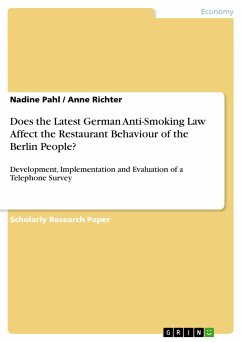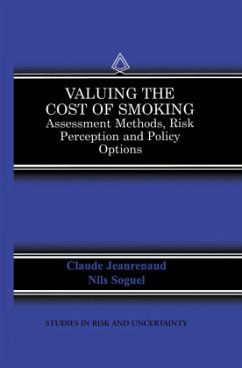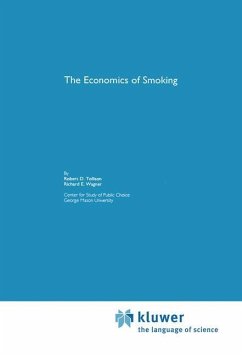
Does the Latest German Anti-Smoking Law Affect the Restaurant Behaviour of the Berlin People?
Development, Implementation and Evaluation of a Telephone Survey

PAYBACK Punkte
0 °P sammeln!
Research Paper (undergraduate) from the year 2008 in the subject Business economics - Economic Policy, grade: 1,0, University of Applied Sciences Berlin, course: Research Methods, language: English, abstract: On the 1st of January 2008, the latest anti-smoking law was introduced in eight German states - and Berlin was one of them. Lower Saxony, Baden-Württemberg and Hessen have introduced this law already in 2007 whereas the remaining five states will follow over this year. By restricting indoor smoking in public buildings, workplaces and in all restaurants and bars, the German government aim...
Research Paper (undergraduate) from the year 2008 in the subject Business economics - Economic Policy, grade: 1,0, University of Applied Sciences Berlin, course: Research Methods, language: English, abstract: On the 1st of January 2008, the latest anti-smoking law was introduced in eight German states - and Berlin was one of them. Lower Saxony, Baden-Württemberg and Hessen have introduced this law already in 2007 whereas the remaining five states will follow over this year. By restricting indoor smoking in public buildings, workplaces and in all restaurants and bars, the German government aims not only to protect non-smokers against the harmful effects of passive smoking but also to help smokers to give up. But from the economic point of view, especially the German restaurant industry complains that many businesses now witness lower profits and especially restaurants that are not in a position to have a separate smokers section are particularly hard hit. As a result, the latest smoking ban is still a heavily discussed topic, not only among German smokers but also among the whole German population. To get an impression whether this smoking ban really affects the restaurant behaviour, the authors of this assignment conducted a telephone survey among Berlin citizens. And the results are someway surprising. Chapter two clarifies the theoretical framework of developing and conducting telephone surveys by stating guidelines that have to be followed, describing the telephone survey process and mentioning general advantages and disadvantages of this primary research method. The main part of this assignment - chapter three - spotlights the whole research process on the basis of a practical example. Here, the telephone survey about the impact of the German anti-smoking law on the restaurant behaviour of the Berlin people is developed, conducted and evaluated. Finally, based on the own experiences of the authors, chapter four includes some errors that may occur within a telephone survey and adds experiences the researchers have made with the telephone survey method.







![The High School Book-keeping [microform]: Containing Illustrations of the Latest and Best Methods of Keeping Accounts by Single and Double Entry: Busi Cover The High School Book-keeping [microform]: Containing Illustrations of the Latest and Best Methods of Keeping Accounts by Single and Double Entry: Busi](https://bilder.buecher.de/produkte/66/66159/66159843n.jpg)





